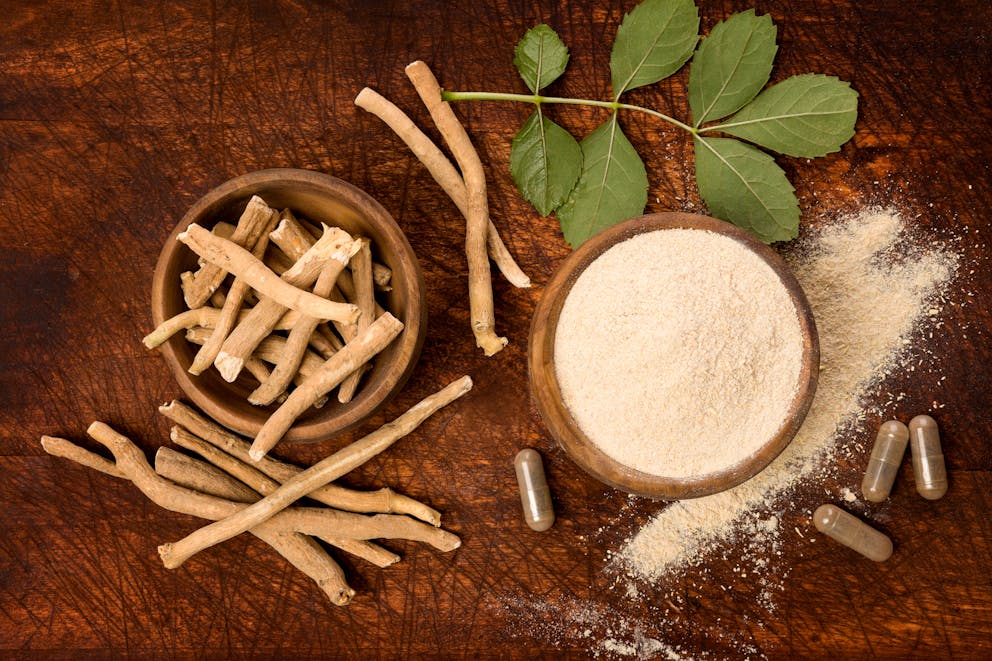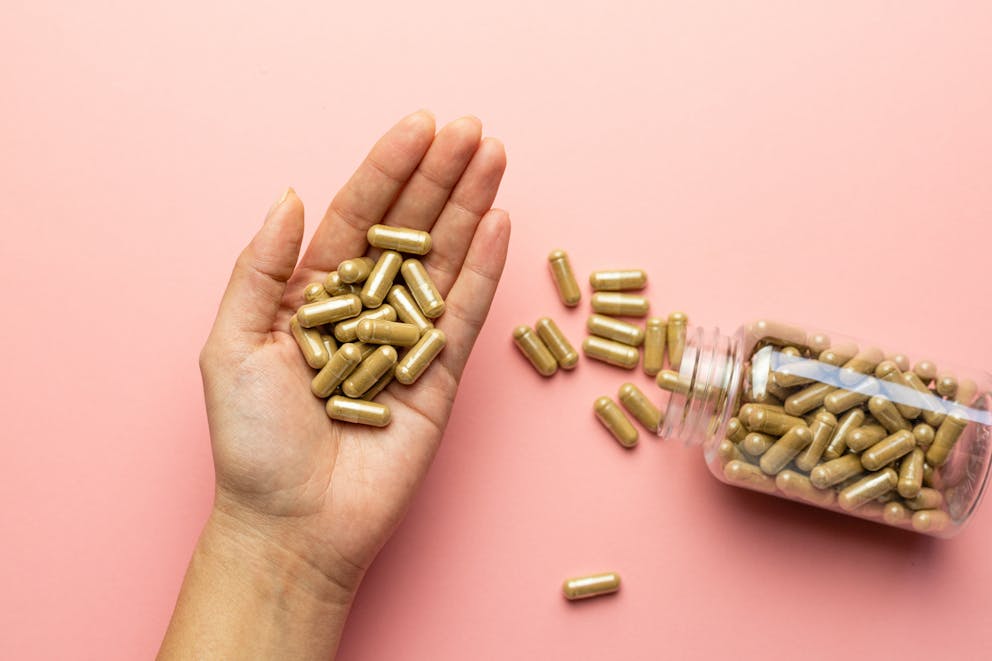Seven Ashwagandha Benefits for Female Health

The First Signs of a Nutrient Deficiency
Learn how to recognize early symptoms related to specific nutrient deficiencies
Receive a downloadable list of early indicators your body is lacking key nutrients

The First Signs of a Nutrient Deficiency
Learn how to recognize early symptoms related to specific nutrient deficiencies
Receive a downloadable list of early indicators your body is lacking key nutrients

The First Signs of a Nutrient Deficiency
Learn how to recognize early symptoms related to specific nutrient deficiencies
Receive a downloadable list of early indicators your body is lacking key nutrients

The First Signs of a Nutrient Deficiency
Learn how to recognize early symptoms related to specific nutrient deficiencies
Receive a downloadable list of early indicators your body is lacking key nutrients

The First Signs of a Nutrient Deficiency
Learn how to recognize early symptoms related to specific nutrient deficiencies
Receive a downloadable list of early indicators your body is lacking key nutrients

The First Signs of a Nutrient Deficiency
Learn how to recognize early symptoms related to specific nutrient deficiencies
Receive a downloadable list of early indicators your body is lacking key nutrients

The First Signs of a Nutrient Deficiency
Learn how to recognize early symptoms related to specific nutrient deficiencies
Receive a downloadable list of early indicators your body is lacking key nutrients

The First Signs of a Nutrient Deficiency
Learn how to recognize early symptoms related to specific nutrient deficiencies
Receive a downloadable list of early indicators your body is lacking key nutrients

The First Signs of a Nutrient Deficiency
Learn how to recognize early symptoms related to specific nutrient deficiencies
Receive a downloadable list of early indicators your body is lacking key nutrients

The First Signs of a Nutrient Deficiency
Learn how to recognize early symptoms related to specific nutrient deficiencies
Receive a downloadable list of early indicators your body is lacking key nutrients

The First Signs of a Nutrient Deficiency
Learn how to recognize early symptoms related to specific nutrient deficiencies
Receive a downloadable list of early indicators your body is lacking key nutrients

The First Signs of a Nutrient Deficiency
Learn how to recognize early symptoms related to specific nutrient deficiencies
Receive a downloadable list of early indicators your body is lacking key nutrients

How to Read Your Body
Learn to recognize common symptoms and uncover their underlying health issues
Understand the signs of nutrient deficiencies to manage your health
Explore the four metabolic body types and the core factors that influence them
Interpret your body's signals from head to toe to identify potential health concerns

How to Read Your Body
Learn to recognize common symptoms and uncover their underlying health issues
Understand the signs of nutrient deficiencies to manage your health
Explore the four metabolic body types and the core factors that influence them
Interpret your body's signals from head to toe to identify potential health concerns

How to Read Your Body
Learn to recognize common symptoms and uncover their underlying health issues
Understand the signs of nutrient deficiencies to manage your health
Explore the four metabolic body types and the core factors that influence them
Interpret your body's signals from head to toe to identify potential health concerns

How to Read Your Body
Learn to recognize common symptoms and uncover their underlying health issues
Understand the signs of nutrient deficiencies to manage your health
Explore the four metabolic body types and the core factors that influence them
Interpret your body's signals from head to toe to identify potential health concerns

How to Read Your Body
Learn to recognize common symptoms and uncover their underlying health issues
Understand the signs of nutrient deficiencies to manage your health
Explore the four metabolic body types and the core factors that influence them
Interpret your body's signals from head to toe to identify potential health concerns

How to Read Your Body
Learn to recognize common symptoms and uncover their underlying health issues
Understand the signs of nutrient deficiencies to manage your health
Explore the four metabolic body types and the core factors that influence them
Interpret your body's signals from head to toe to identify potential health concerns

How to Read Your Body
Learn to recognize common symptoms and uncover their underlying health issues
Understand the signs of nutrient deficiencies to manage your health
Explore the four metabolic body types and the core factors that influence them
Interpret your body's signals from head to toe to identify potential health concerns

How to Read Your Body
Learn to recognize common symptoms and uncover their underlying health issues
Understand the signs of nutrient deficiencies to manage your health
Explore the four metabolic body types and the core factors that influence them
Interpret your body's signals from head to toe to identify potential health concerns

How to Read Your Body
Learn to recognize common symptoms and uncover their underlying health issues
Understand the signs of nutrient deficiencies to manage your health
Explore the four metabolic body types and the core factors that influence them
Interpret your body's signals from head to toe to identify potential health concerns

How to Read Your Body
Learn to recognize common symptoms and uncover their underlying health issues
Understand the signs of nutrient deficiencies to manage your health
Explore the four metabolic body types and the core factors that influence them
Interpret your body's signals from head to toe to identify potential health concerns

How to Read Your Body
Learn to recognize common symptoms and uncover their underlying health issues
Understand the signs of nutrient deficiencies to manage your health
Explore the four metabolic body types and the core factors that influence them
Interpret your body's signals from head to toe to identify potential health concerns

How to Read Your Body
Learn to recognize common symptoms and uncover their underlying health issues
Understand the signs of nutrient deficiencies to manage your health
Explore the four metabolic body types and the core factors that influence them
Interpret your body's signals from head to toe to identify potential health concerns
Ashwagandha's benefits for female health have been known for centuries.
Ashwagandha root extract is a powerful adaptogen that helps to reduce stress and anxiety and has been found to promote balanced hormone levels, menstrual health, and fertility.
Discover seven ashwagandha benefits for women and learn why taking an ashwagandha supplement can help to reduce stress and anxiety.

Seven ashwagandha benefits for female health
Ashwagandha's long-standing use in traditional medicine has ignited considerable scientific interest.
Increasingly more research suggests that ashwagandha can profoundly enhance overall health and may be especially beneficial for female well-being.
Here are seven benefits of ashwagandha for female health.
1. Adaptogen
Ashwagandha is believed to be one of the most powerful adaptogens, meaning it can enhance the body's ability to adjust to physical and mental stress.
Ashwagandha contains withanolides, a group of more than 40 phytochemicals that can modulate various hormonal, neuronal, and immune functions involved in the body’s stress response.
During periods of stress, your adrenal glands release cortisol, an adrenal steroid-hormone that alters metabolic processes to sustain the body during stressful events such as trauma, exercise, injury, or surgery.
While cortisol plays an essential role in mitigating the physiological effects of stress, chronic stress can lead to imbalanced cortisol levels linked to weak immune defenses, high blood pressure, impaired brain function, and changes in body shape and composition, also known as adrenal body type.
It’s believed that ashwagandha stimulates the activity of gamma-aminobutyric acid (GABA), a calming neurotransmitter that helps to regulate the stress response and directly reduces cortisol levels.
A study published in Cureus found that ashwagandha supplementation significantly lowered elevated cortisol in stressed adults, resulting in improved well-being, better sleep quality, and reduced anxiety levels.
2. Hormonal health
Ayurvedic medicine regularly uses ashwagandha to manage female hormone imbalances.
Chronic stress triggers the release of sex hormone-binding globulin (SHBG), a protein that binds to steroid hormones and decreases cortisol's adverse health consequences.
However, SHBG also binds to estrogen, rendering it unavailable for your cells and tissues, which can cause a knock-on effect on other female hormones, resulting in low progesterone and luteinizing hormone production.
Female hormone imbalances are linked to menstrual issues, mood swings, infertility, skin problems, and low libido.
Ashwagandha’s adaptogenic properties can inhibit excessive SHBG production and support balanced hormone levels, which may explain why this medicinal herb has been found so effective in promoting female health.

3. Menstrual health
Ashwagandha promotes balanced cortisol levels needed for regular and healthy menstrual cycles. It also has potent anti-inflammatory properties that can help to reduce painful menstrual cramps, discomfort, and abdominal swelling.
Ashwagandha has anti-anxiety effects and enhances the body's ability to adapt to rapid hormonal changes at the time of ovulation and shortly before the menstrual period. This has been found to reduce premenstrual syndrome (PMS) symptoms, including breast tenderness, cravings, fatigue, anxiety, mood swings, and irritability.
4. Fertility and reproduction
It’s well understood that chronic stress can negatively impact fertility by interfering with hormone balance and disrupting ovulation.
By reducing stress levels, supporting healthy menstrual cycles, and boosting libido, ashwagandha extract may indirectly promote female fertility.
In fact, research published in BioMed Research International concluded, “Ashwagandha has a positive effect in the treatment of infertility both in male and female.”
5. Postmenopausal health
Ashwagandha may help alleviate postmenopausal symptoms such as hot flashes, night sweats, mood changes, and sleep disturbances by promoting hormonal balance.
It may also counteract the effects of declining estrogen levels during menopause linked to an increased risk of osteoporosis.
While more research is needed to confirm ashwagandha's role in maintaining bone mass, there is evidence that it may positively affect bone health by stimulating the activity of osteoblasts, bone-forming cells responsible for maintaining healthy bone mass.

6. Heart health
Ashwagandha is a rich source of withanolides, highly bioactive compounds with blood pressure-lowering effects.
High blood pressure, in combination with elevated cortisol, can significantly impact cardiovascular function and increases the risk of atherosclerosis, irregular heartbeats, and heart attacks.
“Ashwagandha’s potential to lower blood pressure, stress, and anxiety promotes overall health, which is linked to improved cardiovascular health and a lower risk of heart disease,” explains Dr. Berg.
7. Anti-inflammatory
Ashwagandha contains several phytochemicals with potent anti-inflammatory properties that may help to inhibit the release of pro-inflammatory molecules while, at the same time, stimulating immune cells to release anti-inflammatory compounds.
This may explain why ashwagandha has traditionally been used to manage various inflammatory conditions, including arthritis, asthma, inflammatory bowel disease, eczema, dermatitis, and psoriasis.
Watch the video below to learn why ashwagandha is considered the most powerful adaptogen in the world.
What is ashwagandha?
Ashwagandha is a medicinal herb also known as Indian ginseng or winter cherry. It belongs to the nightshade family and grows predominantly in India, the Middle East, and parts of Africa.
Ashwagandha contains several bioactive compounds, including a group of phytochemicals known as withanolides which are believed to have potent anti-anxiety, anti-inflammatory and antioxidant effects.
The roots and berries of the ashwagandha shrub contain the highest concentrations of withanolides and are most commonly used for medicinal purposes.
Where did ashwagandha originate?
The ashwagandha shrub is native to India, Pakistan, and Sri Lanka, and ashwagandha extracts and powders have been used in these regions for more than 3,000 years.
Ashwagandha is a prominent adaptogenic herb used in traditional Ayurvedic medicine to promote many physical and mental health aspects.
Over time, knowledge of ashwagandha's health benefits has spread to other parts of the world, where it has since been cultivated and harvested for its impressive medicinal properties.

How long does ashwagandha take to work?
Ashwagandha isn’t considered a fast-acting herb, and how long it takes for ashwagandha supplements to work depends on your health status, dosage, and the specific health condition being addressed.
While you may experience reduced stress or better sleep within two to three weeks, other effects, such as improved hormonal balance or cognitive function, may take several weeks or even months of consistent ashwagandha use.
What are the side effects of ashwagandha for females?
While ashwagandha is generally considered safe, some individuals appear sensitive to ashwagandha and may experience side effects.
Gastrointestinal symptoms such as nausea and stomach pains are among the most common side effects of ashwagandha supplementation, and taking ashwagandha with food typically resolves this issue.
Some individuals experience sensitivities or allergic reactions to ashwagandha, and it’s crucial to discuss ashwagandha use with a healthcare provider, especially if you have a known allergy to nightshade plants.
If you experience hives, difficulties breathing, or disorientation after taking ashwagandha, seek immediate medical attention.

How much ashwagandha can you have?
How much ashwagandha you should take depends on your overall health status, the specific health condition being addressed, and the potency and formulation of the ashwagandha supplement you are using.
A typical ashwagandha dosage ranges between 300 to 600 milligrams, taken once or twice daily. Taking higher amounts of ashwagandha can significantly increase the risk of side effects.
To lower the risk of potential side effects, it’s crucial to follow the instructions of the ashwagandha product and start with a lower dosage and gradually increase towards the recommended intake.
Watch the video below to learn more about the incredible health benefits of ashwagandha.
What is the best way to use ashwagandha?
The best way to use ashwagandha depends on your personal preferences and what ashwagandha products you have available.
Here are the best ways to use ashwagandha:
Ashwagandha powder can be mixed with warm milk, water, or smoothies. It’s recommended to start with a small dose, not exceeding half a teaspoon per day, and gradually increase as needed.
Ashwagandha supplements are widely available in capsule or tablet form. To avoid gastrointestinal side effects, it’s recommended to take ashwagandha supplements with food.
Ashwagandha herbal tea can be made by steeping dried ashwagandha roots in hot water for 10-15 minutes.
Ashwagandha oils or creams can be applied topically to the skin to soothe and calm irritated and inflamed skin caused by sunburn, eczema, or psoriasis.
 Who shouldn’t use ashwagandha?
Who shouldn’t use ashwagandha?
The safety of ashwagandha during pregnancy and breastfeeding hasn't been adequately studied, and it’s recommended that mothers who are pregnant or breastfeeding, and those who are planning to conceive, avoid ashwagandha-containing products.
Ashwagandha can induce mild sedation and has blood pressure-lowering effects, and it's recommended to avoid using ashwagandha if you are taking sedative drugs or hypertension medications.
In addition, ashwagandha can stimulate the immune system, which could potentially worsen autoimmune conditions such as rheumatoid arthritis, lupus, or multiple sclerosis, and you should consult with a healthcare professional before using ashwagandha if you have an autoimmune disorder.

Key takeaways
Ashwagandha is a powerful adaptogen that enhances the body’s resilience to stress.
In addition, ashwagandha's benefits for female health, such as hormonal balance, fertility, and menstrual regularity, have been known for centuries and may help to lower PMS and postmenopausal symptoms.
Ashwagandha is typically available as a powder or in capsules or tablet form and is generally considered safe up to doses of 600 milligrams daily.
FAQ
1. What does ashwagandha do to a female body?
Ashwagandha has been found to promote hormonal balance, thereby supporting menstrual health and fertility.
In addition, ashwagandha enhances the body’s resilience to stress and supports the adaptation to physiological changes, including rapidly changing hormone levels. This has been found to improve premenstrual syndrome (PMS) and postmenopausal symptoms.
2. What are the top benefits of ashwagandha for female health?
Ashwagandha supports hormone balance which promotes menstrual health and fertility and may lower the risk of postmenopausal-related osteoporosis.
Ashwagandha can significantly enhance the body’s ability to adapt to stress and may improve overall well-being linked to reduced anxiety and can promote vitality, memory, and cognitive function.
3. Is ashwagandha good for female hormones?
Yes, ashwagandha has been found to promote balanced female hormones, including estrogen, progesterone, and luteinizing hormone.
4. What happens when you take ashwagandha daily?
Most people notice reduced stress and anxiety levels and experience improved sleep, better moods, greater energy, and mental focus when taking ashwagandha daily.
5. What are the side effects of ashwagandha for females?
While ashwagandha is generally considered safe and well tolerated, some sensitive individuals can experience gastrointestinal symptoms, mild sedative effects, or allergic reactions when taking ashwagandha supplements.
6. How long does it take to see the benefits of ashwagandha for females?
Most people experience improved well-being and reduced stress within two to three weeks of taking ashwagandha.
However, ashwagandha is considered a slow-acting herb, and it can take several weeks or even months until you notice improved hormonal health.
7. How much ashwagandha can I take daily?
A typical ashwagandha dose ranges between 300 to 600 milligrams per day, taken one to two times daily. However, it’s important to check labels and follow the intake recommendation of the ashwagandha product you are using.
8. Can I take ashwagandha if I’m pregnant?
No. Research about the safety of ashwagandha during pregnancy and breastfeeding is limited, and it’s recommended that mothers who are pregnant or breastfeeding, and those who are planning to conceive, avoid ashwagandha-containing products.
9. How do I use ashwagandha root?
Ashwagandha can be used as a powder, taken in capsule or tablet form, and is available as a topical remedy. You also can make a herbal infusion by steeping dried ashwagandha root in hot water for 10 to 15 minutes.
Previous blog
Eight Reasons You’re Gaining Weight on KetoNext blog
24-Hour Fasting Benefits and RisksTags

Popular
08/21/2024
39K views
05/22/2024
36.1K views
08/19/2024
209.9K views
03/18/2024
11/21/2022




